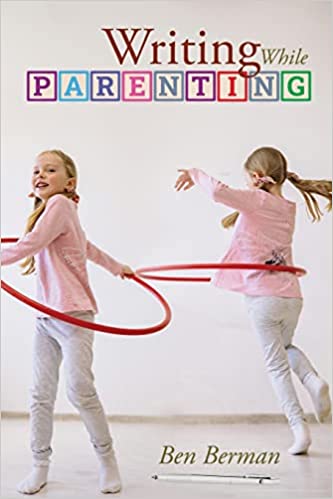
Reviewed by Frannie McMillan
Ben Berman’s fourth book, Writing While Parenting (Able Muse Press, 2022), is a collection of micro-essays running the gamut of day-to-day moments that make up our lives. The title suggests that the focus of the collection will be two-fold (writing and parenting), but in truth these stories extend into every possible corner of being human–which does not require the reader to be either a writer or a parent to find the content interesting and relatable. Berman’s voice is at once serious and witty, certain and questioning, funny and full of sincere self-reflection. He attentively explores parallels and contradictions, mixing wordplay with wonder. The 79 essays are spread over 206 pages and are not divided into specific sections or grouped by topic. Rather, Berman meanders playfully from one topic to the next (often within a single essay) with an eye for detail and nuance. Interestingly, Berman includes an index of topics at the end of the book, as well as a list of works referenced (this is, after all, a book about writing, and Berman touches on a wide range of poets and writers throughout the book). Topics listed in the index include such a hodgepodge that the index is itself the kind of poetry that exists within his prose. For example, under “F” a reader finds Freytag’s Pyramid, fridge cleaning, friends, and Frost, Robert. Under “P” you find prose poems, pro wrestling, and psychologists hanging out together.
It’s this same wit and dorky (but also razor sharp) wordplay that keeps readers chuckling regardless of the essay’s focus. For example, in “Writing Tips,” he writes “Maybe it’s a Jewish thing–the result of God making us snip our members if we want to be members of the tribe–but I always get a little nervous when students start asking me for tips.” He goes on to explore meanings and references to the word “tip,” referring to Hemingway’s advice about a story resembling the tip of an iceberg, considering how tip “can mean both to furnish and to remove,” finally connecting his musings on writing tips to psychologist William James’s examination of the tip of the tongue phenomenon. He repeats this kind of general musing again and again, as in “Thirteen Ways of Looking at Looking,” which is exactly what it sounds like. The refreshing thing about Berman’s musings is that they are rarely tied up into a neat little conclusion that perfectly reconciles the contradictions he has pointed out, and he is clear with readers about that from the very beginning. “The Right Frame,” which opens the collection, begins with Berman sharing that his grandmother died on the same day that his daughter was born. As he considers and rejects all the ways he tried to shape this material into a poem, the reader ends up content that all angles have been explored and, in the end, the conclusion is that writing about the trying to write this poem and failing is actually “the right frame.”
This is part of what makes this book accessible to non-writers–it’s enough that we simply ponder the parallels and contradictions of being human. We don’t have to make sense of this messy life or use the perfect words to describe our emotions. He gives his students (and readers) this kind of permission to slow down and leave things unsaid in “How to Teach Poetry like a Boss”: “for a brief while the classroom feels like an incredibly human place–filled with love and vulnerability, fear and laughter and song–so that my students and I can just kind of smile at one another, knowing that there’s nothing to say and that there is a great weight to that kind of silence.” Readers can’t help but breathe a bit easier when Berman grants us all permission to opt out of tidy, easily understood life lessons and perfectly crafted poems or narratives. In “My Two-Year-Old, the Great Arsenic Lobster,” he sums it up like this: “while we need foundation and craft and technique when we write, we also need mischief and impulse–so that we write the kind of stuff we’d never have thought of in the daylight hours, stuff that doesn’t care about rules, that slaps us across the face when we’re least expecting it, then runs away shrieking in delight.”
As the sizeable list of works referenced suggests, this is still very much a book about writing. Berman is a poet, prose author, and a writing instructor with 20 years of experience and four books under his belt. Although he is certainly qualified to speak with authority on the subject of writing, his approach is more gentle consideration than definitive how-to guide. He draws on the vast, varied wisdom of people like Thomas Edison, Mihaly Csikszentmihalyi, Libba Bray, Aristotle, T.S. Eliot, and dozens upon dozens of others. The overall effect of Berman’s writing and the myriad quotations is, to quote the author himself: “a wildly disjointed collage and a perfectly intricate puzzle” (from “A Body of Work”). Berman’s cheesy dad puns, the way he switches from silly to serious and back again, the glimpses into the mundane yet bizarre moments of a parent’s daily life all pair seamlessly with his meditations on what it means to be a working writer to give us a book that appeals to poets, parents, and lovers of memoir and flash fiction. For those interested in Ben Berman’s other books, visit his website.
________________________
 Frannie McMillan’s poetry has appeared in The Coachella Review, K’in Literary Journal, The Indianapolis Review, and others. She is currently at work on her first chapbook, You Ain’t By Yourself. By day, she connects young people with books as a secondary librarian in Richmond, Virginia. You can find her on Twitter @franniemaq.
Frannie McMillan’s poetry has appeared in The Coachella Review, K’in Literary Journal, The Indianapolis Review, and others. She is currently at work on her first chapbook, You Ain’t By Yourself. By day, she connects young people with books as a secondary librarian in Richmond, Virginia. You can find her on Twitter @franniemaq.

 The core workshop of SmokeLong Fitness is all in writing, so you can take part from anywhere at anytime. We are excited about creating a supportive, consistent and structured environment for flash writers to work on their craft in a community. We are thrilled and proud to say that our workshop participants have won, placed, or been listed in every major flash competition. Community works.
The core workshop of SmokeLong Fitness is all in writing, so you can take part from anywhere at anytime. We are excited about creating a supportive, consistent and structured environment for flash writers to work on their craft in a community. We are thrilled and proud to say that our workshop participants have won, placed, or been listed in every major flash competition. Community works.